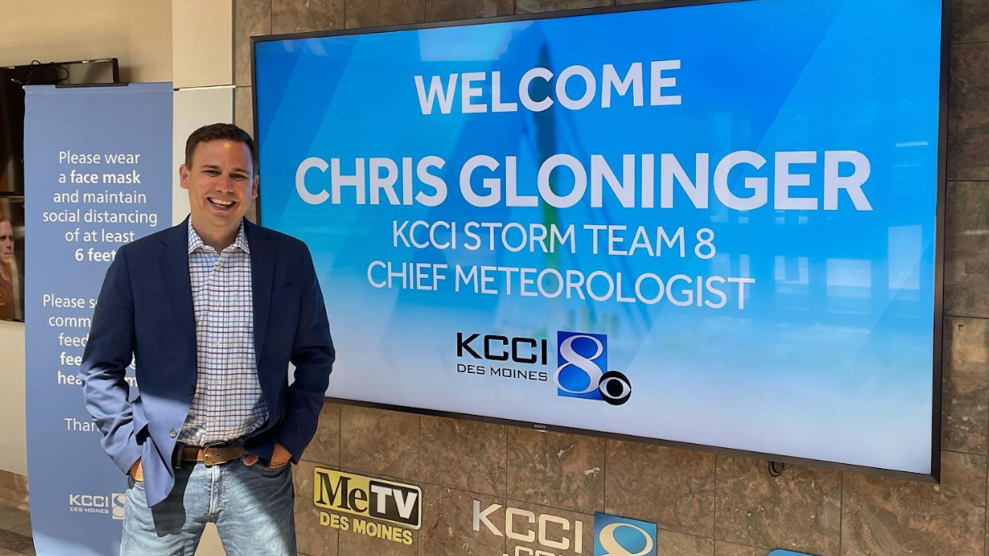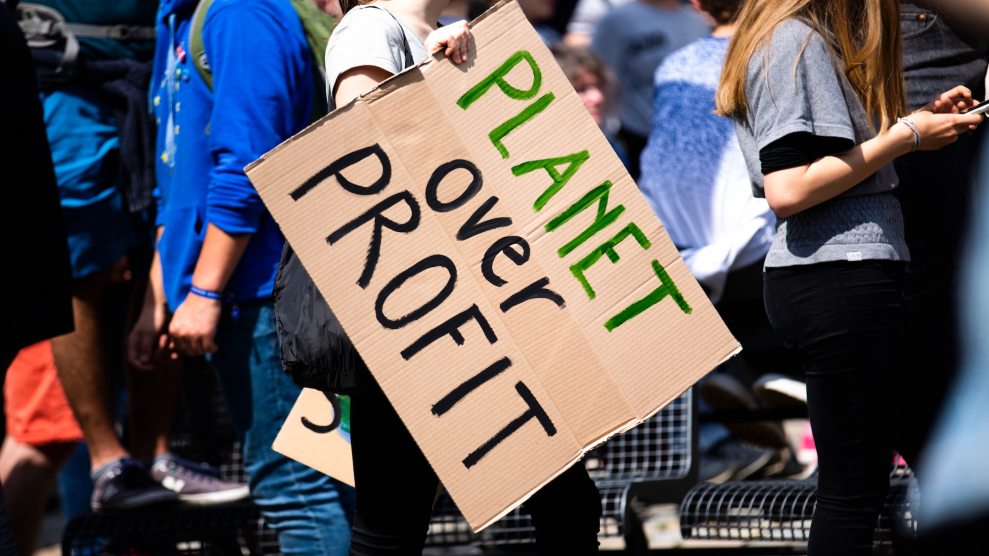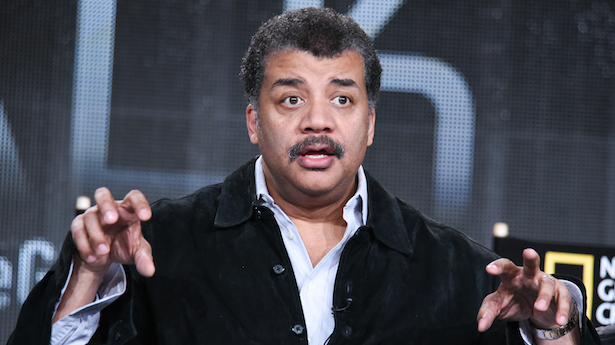
Chris Gloninger on his first day at KCCI 8 in July 2021.Courtesy Chris Gloninger
This story was originally published by the Guardian and is reproduced here as part of the Climate Desk collaboration.
It was a brave, if perhaps scientifically obvious, experiment—to convey messages about the unfolding climate crisis via the regular local TV weather forecasts seen by viewers in the conservative heartland of Iowa. It culminated in the meteorologist involved receiving death threats and exiting the state.
Chris Gloninger, who is 38, has been obsessed with the weather since he was a child, when Hurricane Bob crunched into his New York state hometown, parlaying this into an itinerant career as a TV meteorologist in cities such as Milwaukee and Boston, where he pioneered at NBC-10 what he thinks was the US’s first regular broadcast segment on climate change, in 2010.
Gloninger said he experienced “a holy shit moment” with climate change as he was drenched while covering 2017’s Hurricane Harvey—in which the overheated air and ocean helped dump 9tn gallons of rainwater upon Texas in little over a day. He said he always required a thick skin, like many broadcasters, to deal with casual ridicule over his appearance or voice.
But the experience at KCC-I, a CBS affiliate in Des Moines, Iowa, was more extreme. Hired by the station two years ago to help weave the reality of global heating into his forecasts, Gloninger flagged the science where appropriate, reminding viewers during a flood event that a warming atmosphere holds more moisture, or of the upward march of global temperature during a heatwave.
But this soon provoked angst from some viewers, who grumbled that he should “stick to the weather”. Then, last July, he started getting a string of emails that included threats against his life.
“It was ‘I am going to kill you’ written in a very deliberate way in a long letter and followed by obsessive emails,” said Gloninger. His critic demanded that he “go the hell back to where you came from DOUCHEBAG!!!” and demanded, “what’s your home address, we conservative Iowans would like to give you an Iowan welcome you will never forget.” The emails attacked Gloninger for pushing a “liberal conspiracy theory on the weather,” calling climate change a “Biden hoax.”
What followed was a painful, fraught year in which Gloninger and his wife, Cathy Danko, struggled to deal with what they felt was an overt threat to their safety. The meteorologist started to suffer from stress-induced acid reflux and a chronic cough. He felt his zest for work was diminishing. He ended up in therapy for a year.
“I would go to work until 11 p.m. at night and my wife was alone, we’d worry when a car drove past at night, your heart races a bit,” he said. “I was a first responder for several years and so I’ve seen things that left me upset but this is something I’d never experienced before. We were frightened, we had no idea what a man in rural Iowa would take a stand over. We were awake at all hours.”
KCCI assigned a security detail to Gloninger but also, he said, “told me to dial down the climate stuff a bit.” Ultimately the toll of the threats, combined with family health issues, pushed him to quit the station (the author of the emails was eventually tracked down and handed a small fine). “The death threat was concerning enough to be the catalyst to us leaving,” said Gloninger. “You can only be kicked so many times before you throw in the towel.”
On 21 June, Gloninger, wearing a warming stripes tie, told viewers that he thought he had his “forever home” in Iowa but that the threat had left him “shaken” and that he wanted to move away from TV to work full-time on helping tackle the climate crisis. On his final broadcast, on 7 July, Gloninger choked back tears as he recounted the “mostly happy memories” of Iowa, including the deluge of emails from viewers decrying the threats and praising his focus on climate.
“The management of the station wanted me to avoid the term climate change, maybe talk about changing climate or a warming world, to give people less of a stick to beat them with, which I get but also I don’t agree with,” Gloninger, who started a new role as chief scientist at the Woods Hole Group in Massachusetts last week, told the Guardian. “What gets lost in the mix, though, is that it was remarkable they had the balls to do this in the first place.”
The episode serves as a stark reminder that even though polling shows increasing numbers of Americans are alarmed by the sort of climate impacts on vivid display this summer—with its record, searing heat, ruinous floods, and toxic wildfire smoke—and more meteorologists feel compelled to mention this worsening emergency in their forecasts, there is a significant chunk of the population that sees the crisis as just another part of an all-encompassing culture war.
What happened to Gloninger is part of a broader context of “hateful and hurtful politics which like a cancer is taking over our political discourse—it’s changed radically in just a few years,” according to Eric Sorensen, who was a TV meteorologist for two decades before being elected to the US House of Representatives in 2022.
Sorensen, a Democrat, said he himself was initially skeptical about humanity’s influence over the climate and, once seized by the issue, initially found himself blocked by his bosses from covering it at the WQAD station in Illinois back in 2008 due to the perceived political sensitivity of the topic.
“But when we did end up covering climate, the viewership went up,” Sorensen said. “There is an obligation to communicate this to viewers and that’s best done via the personal connection people have to their local meteorologists—they are the ones protecting your family by telling you it’s time to take the kids into the basement because of a tornado, or get off the roads because of the snow.”
Many meteorologists who do talk about global heating still have to deal with abusive emails, even if death threats are rare, Sorensen added. “A lot of my former colleagues are afraid and I’m worried what happened to Chris will make more of them afraid to talk about this,” said Sorensen, who has invited Gloninger, whom he has known for several years, to speak to members of Congress about his ordeal.
“There were always vocal people against this but now there are threats of violence. We need to be able to communicate climate change and not worry if ratings suffer, or about being victims of angry voicemails.”
TV meteorology used to be a surprising, if niche, bastion of climate skepticism, although that has changed in recent years as the impacts of the climate crisis have become more stark. TV networks in general still regularly neglect to mention the climate elephant in the room—only 5 percent of stations that covered the recent heatwaves in Texas and the US south-west connected them to rising global temperatures, a Media Matters analysis found—so those meteorologists who do highlight climate change in their broadcasts are often the only reliable source on the topic for millions of Americans.
An initiative called Climate Matters now provides climate-related resources to more than 3,000 TV meteorologists and journalists across the US, an effort that research has found “may be increasing the climate literacy of the American people”. Climate is gradually going mainstream on weather forecasts, despite the risk of backlash.
Some meteorologists are still reticent to talk about climate change but that stance is receding, according to Shel Winkley, who regularly talks about climate in his role as chief meteorologist of KBTX News, in Texas. “We aren’t trying to push something, we are just giving information and the emails and calls we get tend to back us up because we are presenting the truth,” he said.
Winkley said the death threats against Gloninger were the talk of a recent conference of TV meteorologists, but that the situation won’t deter him from responding to every email and Facebook comment from climate deniers critiquing his work. “I don’t try to shut people down, it’s a conversation that sometimes ends poorly and sometimes you make a bit of headway on,” he said. “A lot more people are supportive of the science now. But what happened to Chris is scary, I won’t say it’s not. Sadly, it’s not surprising.”
Gloninger also feels that he hasn’t been cowed, despite the saga prompting him to move 1,300 miles from Iowa to Cape Cod. In his last few weeks at KCCI, he became candid in an unvarnished way, referencing, on air, the “climate crisis” and that the recent withering heat “should be ringing alarm bells”. He showed off printouts of more than 300 emails from viewers thanking him for his work.
“I’ve been encouraged that in a true conservative state, many want climate action and many people want to see more coverage of climate change,” he said.
“I don’t think that the people who harassed me won. I’m just reinventing myself in my career. This can be the start of a new chapter in this state, where people have a little more basic understanding of what’s happening. People will have a decision next year [in the presidential election] over whether to keep pushing for change.”












